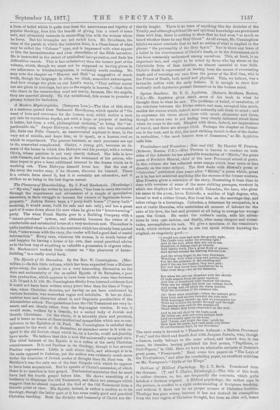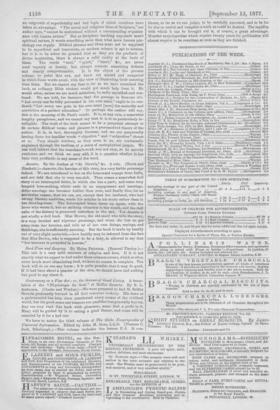Outlines of Biblical Psychology. By J. T, Bock. Translated from
the German: (T. and T. Clarke, Edinburgh.)—The title of this book is rather obscure, so, too, are frequently the contents, which quite betoken a German original. A. Biblical psychology, the author says in the proface, is needful to a right understanding of Scripture teaching, and without it there can be no proper science of Christian doctrine. Theology has gone astray, because it has not derived its conceptions from the tine region of Christian thought, but from an alien soil, hence an outgrowth of superficiality and bad logic of which outsiders have taken an advantage. The moral and religious ideas of Scripture," our author says, "cannot be understood without a corresponding acquaint- ance with human nature." But as Scripture teaching expounds man's spiritual nature, it wants something more than what mere human psy- chology can supply. Biblical phrases and ideas must not be supposed to be superficial and inaccurate, as modern science is apt to assume, but it is to be taken for granted that as they are the products of divine inspiration, there is always a solid reality at the basis of them. The words "soul," "spirit," "heart," Sze., are never used vaguely or loosely, but always connote something definite and clearly comprehensible. It is the object of the present volume to point this out, and texts are quoted and compared in whieh those words occur, with the view of illustrating their meaning from them. But we cannot say that so fat' as we have examined the book, an ordinary Bible student would got much help from it. He would often, unless we are much mistaken, be Badly mystified and. con- fused. We are told, for instance, that the passage in Romans xiv. " Let every one be fully persuaded in his own mind," ought to be ren- dered, ',Let every one gain in his own mind [nous] the maturity and conviction of a perfect edueation." Or perhaps the author will say, this is the meaning of St. Paul's words. It is, at any rate, a somewhat lengthy paraphrase, and we cannot say that it is to us particularly in- telligible. The fault of the book seems to be a perpetual attempt to fit certain Biblical terms and phrases to a preconceived theory of the author. It is, in fact, thoroughly German, and we are perpetually having those too familiar words " objeetive " and " subjective " thrust at us. Very simple matters, as they seem to us, are continually explained through the medium of a mass of metaphysical jargon. Wo can well believe that the translator's work was not easy, as he naively confesses, and we think we may add, it is a question whether it has been very profitable in any sense of the word.































 Previous page
Previous page